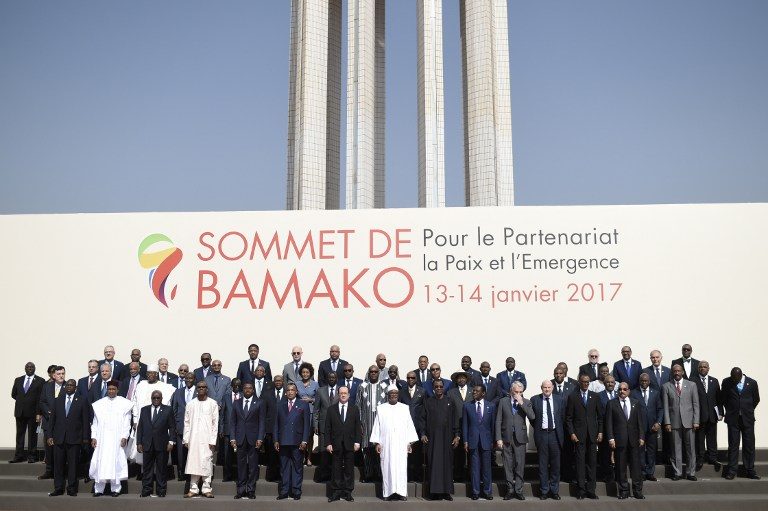SUMMARY
This is AI generated summarization, which may have errors. For context, always refer to the full article.

BAMAKO, Mali – Gambian president-elect Adama Barrow was due to meet world leaders on Saturday, January 14, at a summit jointly hosted by France in Mali as the international community strives for an end to The Gambia’s political crisis.
Barrow flew to Bamako unexpectedly after holding crisis talks in Banjul with Nigerian President Muhammadu Buhari, Liberian leader Ellen Johnson Sirleaf and Ghana’s John Mahama.
The delegation of west African heavyweights also met with Gambian President Yahya Jammeh, who is refusing to cede power after disputing a December 1 election result that declared Barrow the winner.
In a sign of Barrow’s growing international clout, a French diplomatic source told Agence France-Presse (AFP) that President Francois Hollande “intends to meet” Barrow, while the former businessman was due to sit down with west African leaders to discuss his nation’s future.
The Economic Community of West African States (ECOWAS), a 15-nation bloc, has repeatedly called on Jammeh to respect the result of the vote that delivered Barrow to victory, and step down after 22 years in power.
Jammeh has made clear he will not stand aside until the country’s Supreme Court decides on his legal challenge seeking to annul the results of last month’s polls, which he initially conceded losing.
The ruling is unlikely to happen before May.
There are just 4 days left of Jammeh’s 5-year term, but he warned the international community on Tuesday that “undue external interference” was unnecessary.
Mohamed Ibn Chambas, head of the UN Office for West Africa and the Sahel, said Friday that ECOWAS would ask the Security Council to approve the deployment of troops to The Gambia if Jammeh refuses to cede power. (READ: UN Security Council demands Gambia’s Jammeh hand over power)
Security tops agenda
Heads of state from at least 30 nations were due in Bamako to also discuss the fight against jihad, governance challenges and Africa’s role in the European migrant crisis.
Many of the nations attending the gathering were once colonies of France, which in recent years has boosted its military involvement on the continent.
Also present are Zimbabwean President Robert Mugabe and Rwandan leader Paul Kagame, who have a particularly tense relationship with Paris.
In a bid to help crush the jihadist threat, France has trained more than 20,000 African soldiers every year since 2013, according to a French diplomatic source.
By 2020, the number of French-trained troops is expected to reach 25,000 a year.
The training drive aims to minimise the need for direct military interventions in African conflicts, such as those launched in Mali and the Central African Republic in 2013.
However the situation in key nations such as Mali remains far from stable, where France continued military presence is not universally welcomed.
Overshadowing the summit was an admission by the French defence ministry on Friday that French soldiers deployed to northern Mali had killed a child jihadist during a counter-terror operation in November.
According to the French-language magazine Jeune Afrique, the victim was buried in secret by the soldiers.
Hollande said Friday that those battling jihad in Africa and the Middle East were like France part of “the same fight” against extremism, visiting French soldiers at a military base in the northern Malian city of Gao.
“The terrorists who attack our land, who commit acts on our soil, are allied with those who are in the Levant, in Iraq and Syria, but here as well, in the Sahel,” Hollande said.
Elsewhere, discussions were expected on the abuse of African constitutions. In recent years leaders like Kagame have altered their constitutions to remove term limits, to the dismay of democracy advocates on the continent.
Another concern for the summit is unrest in Democratic Republic of Congo, where President Joseph Kabila’s refusal to step down has sparked a political crisis. – Rappler.com
Add a comment
How does this make you feel?
There are no comments yet. Add your comment to start the conversation.